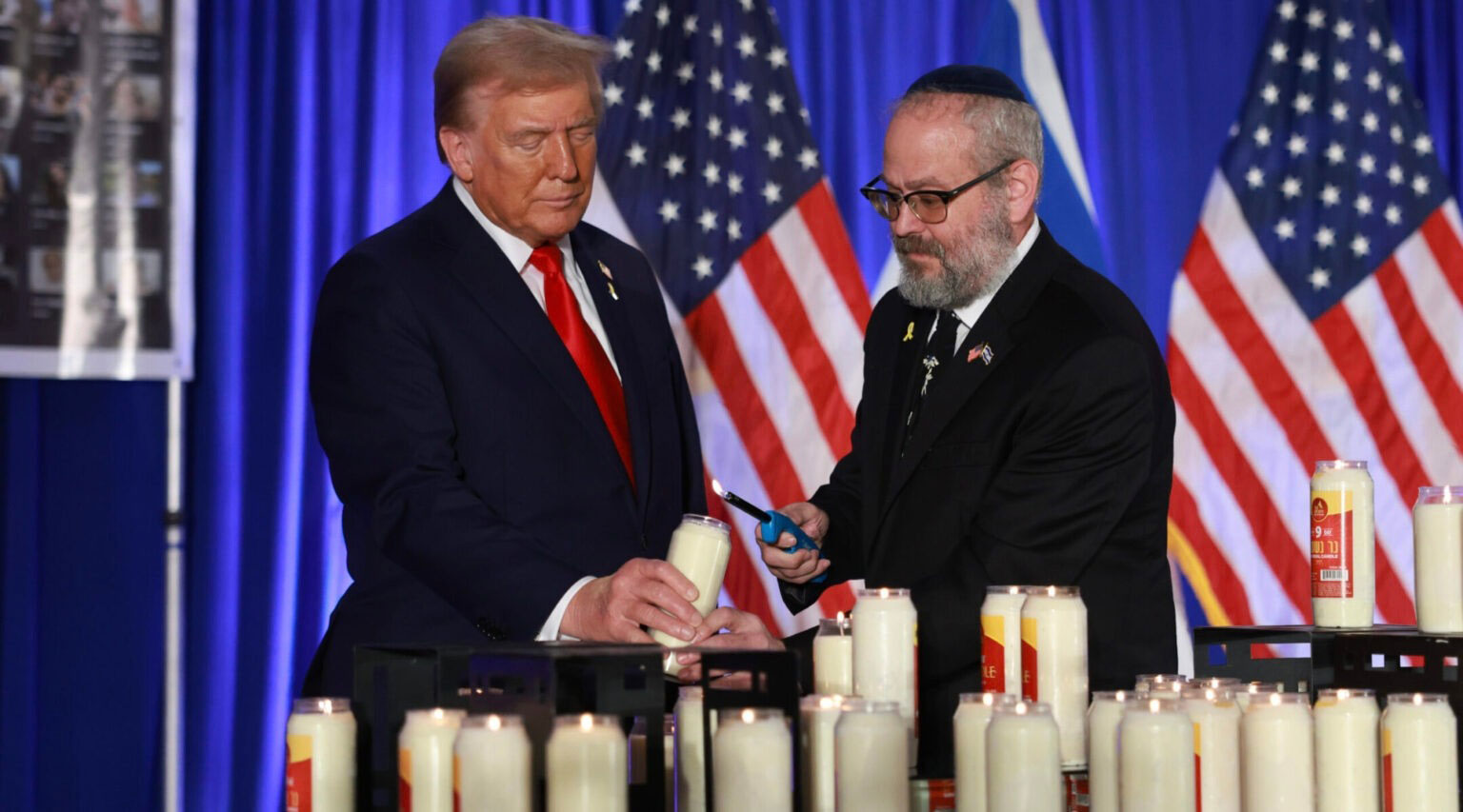(JTA) — Candidates sparred over whether to send U.S. troops to Gaza and Vivek Ramaswamy endorsed a conspiracy theory that inspired antisemitic violence at the Republican primary debate last night.
The debate, held at the University of Alabama less than six weeks before the Iowa caucuses kick off the nominating contest, did not include the frontrunner, Donald Trump. The former president, who leads polls by a wide margin, has skipped every debate thus far.
Haley, the former United Nations ambassador who is rising in the polls and has received an infusion of donor money, was the prime target of the other three candidates on stage: former New Jersey Gov. Chris Christie, Florida Gov. Ron DeSantis and Ramaswamy, an investor and political newcomer.
Israel came up almost immediately in the debate, hosted by the small cable network News Nation. Moderators asked whether candidates would send troops into combat to free the eight Americans who are among the more than 100 hostages still held by Hamas, which launched the current war when its terrorists attacked Israel from Gaza on Oct. 7.
Christie said, “You’re damn right, I’d send the American army in there to get our people home and get them home now.”
DeSantis said “We have to look out for our people when they’re hostages” and segued into attacking President Joe Biden for not doing enough to confront Iran. He later said he wouldn’t accept Gazan refugees into the United States “because of the antisemitism and because they reject American culture.”
Haley also didn’t answer the question about U.S. troops directly, also attacking Biden for not being aggressive enough toward Iran. She added that Russia, Iran and Hamas are linked and pose a threat to global stability, an argument Biden has also made.
“You’ve got to punch them, you’ve got to punch them hard and let them know that — that’s the only way they’re going to respond, so the way you do that is you go after their infrastructure in Syria and Iraq where they’re hitting our soldiers,” Haley said of Iran. “That’s what you do, and then that’s when they’ll back off.”
Ramaswamy attacked Haley for comments she has previously made where she called Hamas’ invasion of Israel an “attack on America.”
“If you can’t tell the difference between where Israel is and the U.S. is on a map I can have my three-year-old son show you the difference,” he said. “That is irresponsible, because it has major consequences, because that doesn’t leave room for what actually is an attack on America.”
Late in the debate, Ramaswamy leaned into promoting conspiracy theories that Trump had embraced — including the false claim that Trump won the 2020 election; that the Jan. 6, 2021 mob at the U.S. Capitol, aimed at keeping Trump in power, was an “inside job;” and that the George W. Bush administration covered up the real perpetrators of the Sept. 11, 2001 attacks;
He also said that “the Great Replacement Theory” is the policy of the Democratic Party. The theory in its original form claims falsely that Jews are orchestrating the mass immigration of people of color into Western nations in order to replace their white populations.
The theory fueled the deadliest attack on Jews in U.S. history, when a gunman murdered 11 Jews at a Pittsburgh synagogue in 2018, as well as other violent mass killings.
“The Great Replacement Theory is not some right wing conspiracy theory, but a basic statement of the Democratic Party’s platform,” he said. He did not directly mention Jews.
Ramaswamy also attacked Haley for accepting the backing of wealthy donors. The most significant of these is the Koch network, named for the industrialist brothers who are not Jewish; Ramaswamy named only Jewish backers, including LinkedIn founder Reid Hoffman and BlackRock CEO Larry Fink.
He called Hoffman “George Soros Jr.,” referring to the liberal Jewish financier and philanthropist who has become a bogeyman of the right and who frequently appears in antisemitic conspiracy theories. DeSantis also name-checked Soros, noting that he had removed two prosecutors in Florida whom he said Soros backed.
Haley said her greatest concern about porousness on the U.S.-Mexico border was that it could facilitate the entry into the United States of Iran-backed terrorists.
She also took a question about a confrontation in Congress Tuesday between Republican Rep. Elise Stefanik and the presidents of three elite universities who declined to say outright that calling for the genocide of Jews would violate university anti-harassment policies. Two of the presidents have since partially walked those statements back.
Haley called the remarks of the university presidents “disgusting” and said she would alter President Joe Biden’s strategy to combat antisemitism by making clear that anti-Zionism is antisemitism. Congress just passed a resolution to that effect, as well.
She also pivoted to one of her key talking points, which is to fault the Chinese-owned TikTok social media app as a potential tool of the Chinese government.
“For every 30 minutes someone watches TikTok every day they become 17 percent more antisemitic,” she said, apparently referring to an analysis posted online last week by an investor, Anthony Goldbloom, who posted that the data “suggests TikTok is a meaningful driver of a surge in antisemitism.”
GOP candidates spar in debate over whether to send US troops to Gaza

Courtesy of JTA. Photo credit: Jim Watson / AFP/Getty Images
Former Governor from South Carolina Nikki Haley looks on as Florida Governor Ron DeSantis, right, and former Governor of New Jersey Chris Christie, left, gesture toward each other as they speak during the fourth Republican presidential primary debate at the University of Alabama in Tuscaloosa, Alabama, Dec. 6, 2023




